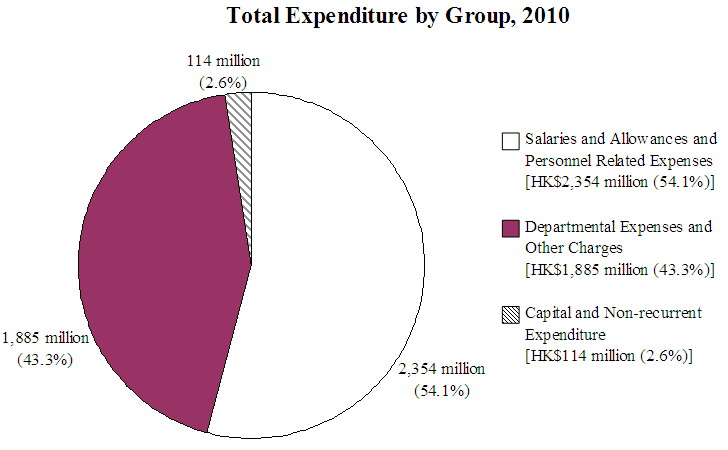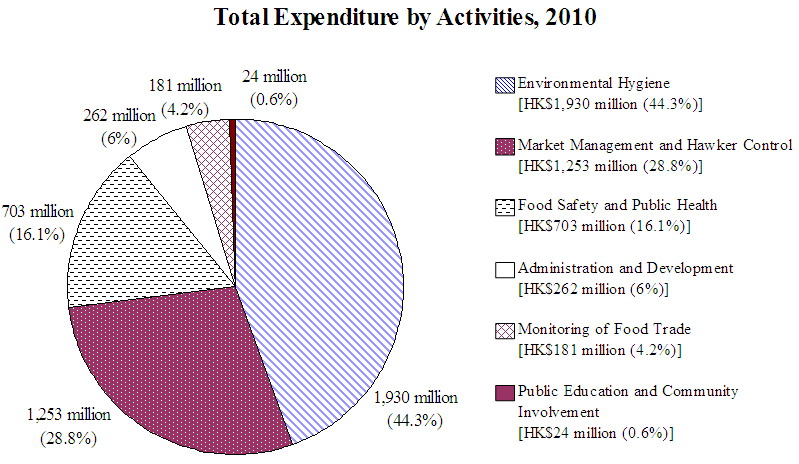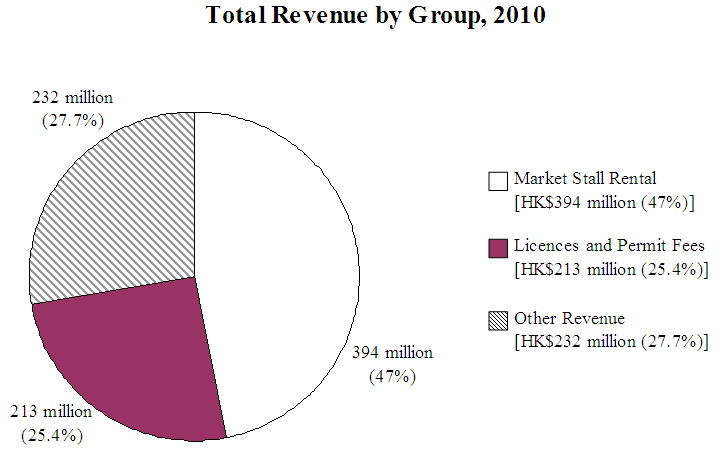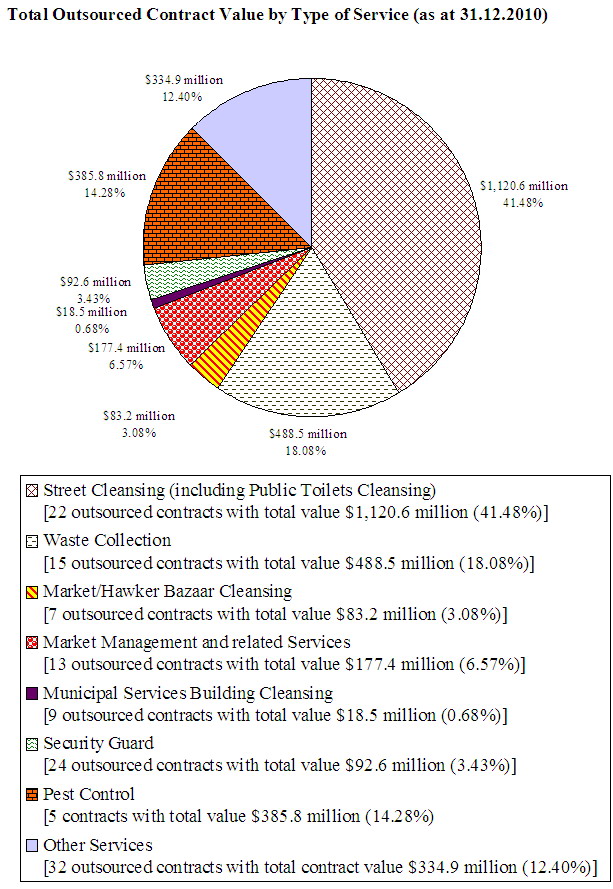The Administration and Development Branch provides various management and support services to the Department.
Grade Management
There are three major grades covering Health Inspectors, Hawker Control Officers and Foremen. Two grade managers, one for the Health Inspector grade and another for the Hawker Control Officer and Foreman grades, are responsible for staff matters involving manpower planning, career development, postings, promotion and training.
Health Inspectors are responsible for various environmental hygiene and food safety functions, such as handling of environmental nuisance cases, hygiene inspections to food establishments, licensing, prosecution, meat inspection, cleansing services, outsourcing, pest control, hawker control, management of markets, cemeteries and crematoria, food control and health education.
Hawker Control Officers are responsible for controlling on-street hawking activities, managing hawker permitted places and taking law enforcement action against illegal hawking activities. They also play an important part in prosecuting people alleged to have committed cleanliness offences, such as littering and spitting.
Foremen are mainly responsible for supervising the work of front-line staff in street cleansing, waste collection, pest control and market management. They are also responsible for transport services and monitoring the performance of the Department's service contractors. Members of the grade also take legal action against cleanliness offenders.
Training
Training and development programmes are provided to enhance the overall competence and professionalism of staff, bringing out their best to serve the public and heightening their awareness of occupational safety and health. Training programmes mainly take the form of vocational, management, information technologies, occupational safety and communication courses and selected staff would also attend overseas courses.
During the year, the Department organised and co-ordinated 739 classes, which were attended by 12,201 trainees, adding up to a total of 30,071 trainee-days. Different induction training programmes were given to a total of 360 new recruits to equip them with the necessary competence to discharge their duties. In addition, the Department provided full or partial financial sponsorship to 19 staff members to pursue employment-related studies outside office hours, and 53 officers were placed in 39 training programmes outside Hong Kong, involving a total of 335 trainee-days.
Management Services
The Management Services, Survey and Statistics Section mainly provides management consultancy and statistical services to the Department. They help management improve the delivery of public services, monitor the standard of performance and formulate policy in the provision of services and staffing. Ongoing consultancies are provided to assist the Department in the implementation of recommendations of studies and technical advice is offered to help the Department conduct statistical surveys and analyse data.
Five management studies were completed during the year. In addition, a number of statistical surveys were conducted on issues such as public opinion on the Department's services or facilities as well as public attitude to food safety and nutrition labelling.
Financial Management
Note: Figures may not add up to 100% due to rounding.
All matters relating to expenditure and procurement, including payment processing, financial advice and monitoring, are handled by the Finance and Supplies Division.
In 2010, the Department spent $4,353 million, including $2,354 million on salaries and allowances and personnel related expenses, $1,885 million on departmental expenses and other charges, and $114 million on capital and non-recurrent expenditure.
By activities, the majority of the expenditure ($1,930 million) was on environmental hygiene. This was followed by $1,253 million on market management and hawker control, $703 million on food safety and public health, $262 million on administration and development, $181 million on monitoring the food trade, and $24 million on public education and community involvement.
In 2010, the Department received a revenue of $839 million. Most of the revenue came from the rental of stalls in public markets managed by the Department ($394 million) and from licence and permit fees ($213 million). Other sources included revenue from cemeteries and crematoria services ($81 million), court fines and statutory penalties ($52 million), slaughterhouse and other concessions ($50 million), meat examination ($23 million) and miscellaneous services ($26 million).
Capital Works
In the Government's 2010 Capital Works Resource Allocation Exercise, the five-year allocation on capital projects for food and environmental hygiene services is estimated at $2,093 million. Of the total allocation, about $1,747 million is to meet expenditure on projects under construction or completed with outstanding accounts, while $346 million has been earmarked for new projects.
Markets
During the year, improvement works to Lam Tei Market, Tung Chau Street Temporary Market, Tui Min Hoi Market and Pei Ho Street Market were completed.
Refuse Collection Points
As part of the continuing efforts to improve Hong Kong's living environment, the Department is replacing temporary roadside refuse collection points (RCPs) with off-street facilities in enclosed buildings equipped with modern de-odourising installations. During the year, construction works for Wu Shan Road RCP were completed.
Public Toilets
Two new public toilets were completed in 2010, namely, Ngong Ping Road Interchange Public Toilet and Wu Shan Road Public Toilet.
Under the Public Toilet Refurbishment/Improvement Programme, 14 projects were completed in 2010 and another 49 are in progress or being planned.
To continue the programme to convert all aqua privies into flushing toilets by 2013, works for 42 aqua privies were completed in 2010. Works for 77 aqua privies which commenced in November 2009 for completion in mid-2011 are either in progress or under planning. Planning for the conversion of another 145 aqua privies in the final phase by 2013 is underway.
Cemeteries and Crematoria
Reprovisioning of Wo Hop Shek Crematorium commenced in July 2009 for completion at the end of 2011/in early 2012 while that of Cape Collinson Crematorium began in June 2010 for completion at the end of 2014. Reprovisioning of Garden of Remembrance at Diamond Hill Crematorium started in October 2010 for completion at the end of 2011. Construction works of a new columbarium and a Garden of Remembrance at Kiu Tau Road in Wo Hop Shek commenced in December 2009 for completion in mid-2012.
The Government is contemplating all feasible measures to increase the supply of public columbarium facilities. These include promoting district-based columbarium development scheme and providing additional niches in existing cemeteries. During the year, 17 sites in 12 districts have been identified for consideration of columbarium facility development. The Department will take forward further planning actions for sites found suitable for the purpose.
Outsourcing of Services
By end 2010, 127 contracts valued at $2,701.5 million were in force for the provision of services by private contractors. The outsourcing policy is aimed at greater cost-effectiveness and efficiency in the delivery of services.
Examples of outsourcing services include: street cleansing, waste collection, mechanical street sweeping, mechanical gully cleansing, collection of recyclables, market/hawker bazaar cleansing, market management and related services, pest control services, municipal services building cleansing, security guard services, animal carcass collection, cleansing and horticultural maintenance services for cemeteries and columbaria, etc.
Measurable performance standards are written into contracts to ensure the quality of services provided. Protective clauses have also been included in tenders to safeguard the rights and benefits of non-skilled workers. In addition to daily checking, supervisory checks are conducted to ensure compliance by contractors.
Complaints Management
The Complaints Management Section is responsible for formulating and reviewing policies on, and procedures for, handling all types of complaints. In 2010, the Department received 177,700 requests or referrals for seeking departmental services and 4,900 complaints on staff or operations-related matters.
Quality Assurance
Continuous improvement is one of the priority tasks of the Department to ensure provision of quality services to the public.
The primary objective of the Quality Assurance Section is to monitor and improve service quality. To achieve this objective, the section conducts day-to-day regulatory inspections on services provided by the Department and service contractors. Recommendations are made for improvements to services with identified inadequacies in existing operational systems, procedures and guidelines. The section also recommends good performers for Quality Assurance Awards and Certificates of Meritorious Performance to motivate outstanding and hardworking front-line staff. In addition, the section investigates staff-related cases of dereliction of duty and employment-related complaints of service contractors in an independent, objective and fair manner. The section also conducts audit inspections and employment-related inspections to check service contractors' compliance with employment-related commitments.
Public Education and Publicity
Public education plays an important role in ensuring food safety and improving environmental hygiene. To this end, the Department organises publicity and educational programmes, and arranges exhibitions, outreaching programmes and seminars to enhance the general public's awareness of these issues.
The Department operates a Communication Resource Unit (CRU) at the Fa Yuen Street Municipal Services Building and a Health Education Exhibition and Resource Centre inside Kowloon Park.
The CRU is located in the city centre and maintains a rich collection of food safety related promotion resource materials for both consumers and the food trade. It has set up an exhibition hall with designated information corners for the general public and the trade. They are equipped with audiovisual facilities and provide visitors with easy and comfortable access to the resource materials. Organised visits, food safety related talks, and loan service of resource materials, exhibition boards and audio-visual resources are also available to the public at CRU.
The Health Education Exhibition and Resource Centre arranges group visits and guided tours for schools, elderly centres, children and youth centres, organisations for the disabled and the public. Seminars, talks and outreaching activities are also conducted regularly. During the year, the centre attracted 144,754 visitors, and organised 1,077 talks-cum-activities for kindergartens, primary schools and secondary schools, 1,030 talks for elderly centres and 264 talks for the general public. The Mobile Education Centre (a publicity vehicle) of the centre also visited 220 schools, housing estates and public parks in promoting public health and environmental hygiene messages. The vehicle was revamped in late 2010 to introduce more interactive and multi-media features.
On food safety, various publicity and educational programmes were organised for the food trade and the public on the Five Keys to Food Safety, the Hazard Analysis and Critical Control Point (HACCP) system, risk perception, and other food safety initiatives and new regulations. Members of the food trade were invited to sign up to the Food Safety Charter 2010/11 to provide quality services grounded on food safety to Hong Kong people and tourists.
To tie in with the enactment of the Food and Drugs (Composition and Labelling) (Amendment: Requirements for Nutrition Labelling and Nutrition Claim) Regulation 2008, a three-year publicity and education campaign is in place to promote the use of nutrition labelling in achieving healthy eating. The theme of the Food Safety Day 2010 held on 28 June was "For Your Health, Count on the Nutrition Label 1+7" with a view to enhancing consumers' awareness of the Nutrition Labelling Scheme and understanding of the benefits of reading nutrition labels.
To cater for the specific needs of the food trade, seminars on restaurant licensing were arranged on a bi-monthly basis for those who have applied for restaurant licences or are considering starting a restaurant business.
In 2010, the Department continued its publicity on disseminating environmental hygiene messages through television and radio Announcements in the Public Interest, banners, posters, pamphlets and leaflets. Anti-rodent and anti-mosquito campaigns were organised to solicit public support and participation in pest control. Support was also given to cleansing campaign/work by non-government organisations.









